Media caption
Should I wear a mask to stop coronavirus?
Advice on whether the public should wear face masks has been passed on to the UK government by its scientific advisers.
The Scientific Advisory Group for Emergencies (Sage) looked at issues like protecting the supply of medical face masks, and the public covering their faces with scarves or homemade masks.
Why doesn't everyone wear a mask now?
The World Health Organization (WHO) says only two groups of people should wear protective masks, those who are:
- sick and showing symptoms
- caring for people suspected to have coronavirus
It says medical masks should be reserved for healthcare workers.
Masks are not recommended for the general public because:
- they can be contaminated by other people's coughs and sneezes, or when putting them on or removing them
- frequent hand-washing and social distancing are more effective
- they might offer a false sense of security
The European Centre for Disease Prevention and Control agrees that medical face masks should be prioritised for healthcare workers. But it says non-surgical face masks might help stop the spread of coronavirus by people who are contagious but have no symptoms.
This might be particularly useful in busy spaces, such as grocery stores, shopping centres, and on public transport, it says.
Coronavirus is spread by droplets that can spray into the air when those infected talk, cough and sneeze. These can enter the body through the eyes, nose and mouth, either directly or after touching a contaminated object.
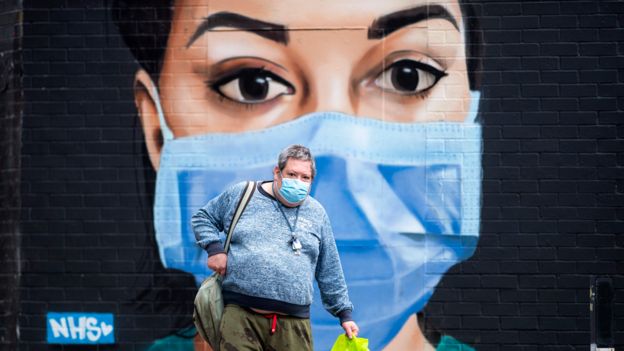 Image copyright
Image copyright
GETTY IMAGES
How might things change?
The UK government is not currently advising most people to wear masks, but has said it will consider what its scientific advisers say.
However, the cabinet did not discuss the subject at its meeting on Thursday morning.
At the weekend, more than 100 doctors wrote a letter to The Times saying they were "alarmed at official inaction over the need for the public to wear homemade face masks".
They said it was "illogical" to advise people to wear masks if they are showing symptoms, but not if they appear symptom-free.
London Mayor Sadiq Khan has urged people to use non-medical face coverings, such as a scarf or bandana, when social distancing is not possible.
And while the WHO has not changed its advice, its special envoy Dr David Nabarro believes that "some form of facial protection is going to become the norm" across society.
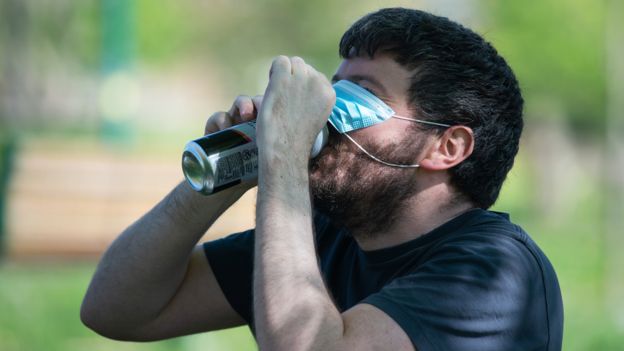 Image copyright
Image copyright
GETTY IMAGES
What face masks are used by health workers?
The widespread use of face masks by the public could put NHS supplies at risk, says Chris Hopson, chief executive of NHS Providers.
In hospitals, different types of mask offer different grades of protection. The most protective is an FFP3 or, alternatively, an N95 or an FFP2.
NHS staff in lower-risk situations can wear a surgical mask. This includes healthcare workers within one metre of a patient with possible or confirmed Covid-19. These staff may be in hospitals, primary care, ambulance trusts, community care settings and care homes.
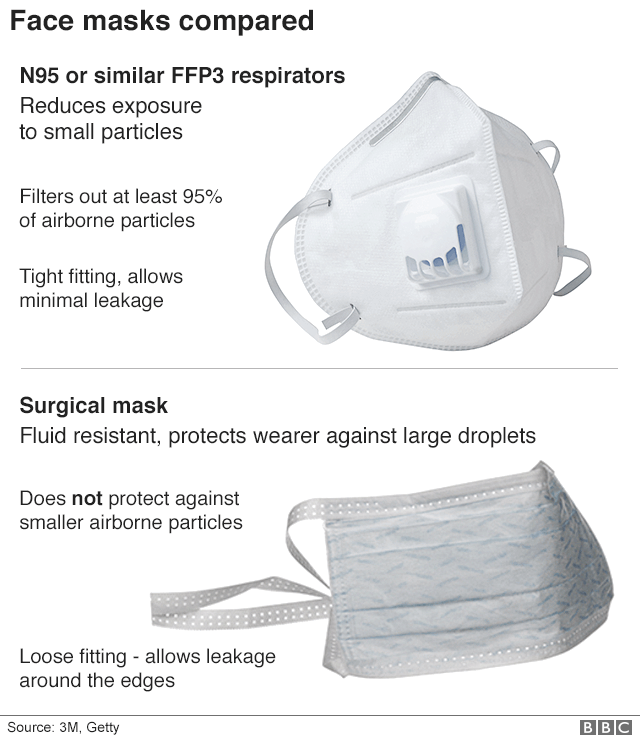
![]()
Where am I supposed to get a mask?
Some masks are still available online, but it can be difficult to know how safe they are and prices are often high.
Masks are out of stock in many High Street pharmacies as are those used for home improvements in many DIY stores.
And Health Minister Matt Hancock has said that, unlike in France, the government cannot promise free masks for the general public if required. "It would be an extraordinary undertaking," he said.
What about homemade face masks?
If wearing homemade masks is recommended, there is lots of advice online about how to make them.
Suggestions include using common household items, such as cotton fabric from old T-shirts or bedding.
However, homemade masks are not regulated, whereas officially-made ones have to meet safety requirements.
Reusable cloth masks are not recommended and may even increase the chance of infection, say European advisers. This is because there is a high chance virus particles could go through cloth, and moisture in it could retain the virus, they warn.

What do I need to know about the coronavirus?
- A SIMPLE GUIDE: How do I protect myself?
- AVOIDING CONTACT: The rules on self-isolation and exercise
- HOPE AND LOSS: Your coronavirus stories
- LOOK-UP TOOL: Check cases in your area
- VIDEO: The 20-second hand wash
![]()
What is happening in other countries?
Other countries have brought in different rules around the wearing of face masks.
They are to become compulsory on public transport in Germany, and in supermarkets and pharmacies in Austria.
Residents in Lombardy in Italy must cover their nose and mouth when outside and the French government plans to give out masks to the general public.
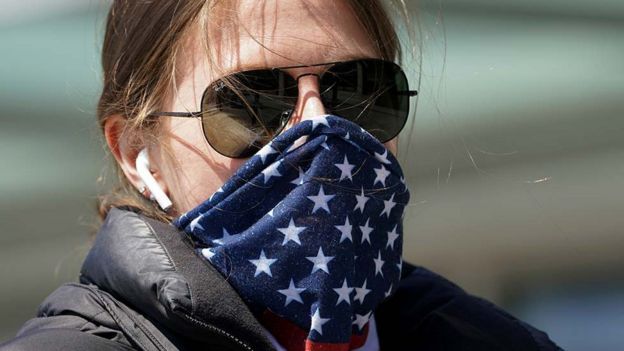 Image copyright
Image copyright
REUTERS
Image caption
Americans have been advised to use clean cloth or fabric to cover their faces
Air passengers in Canada must wear a non-medical mask or a face covering, and in the USA, people are advised to wear "cloth face coverings" in supermarkets and pharmacies.
What else can protect against coronavirus?
Gloves and other protective wear are recommended for NHS staff working in places where they could encounter coronavirus.
Again, staff in the highest-risk scenarios are advised to wear fuller protection, rather than a simple apron, gloves, mask and goggles.
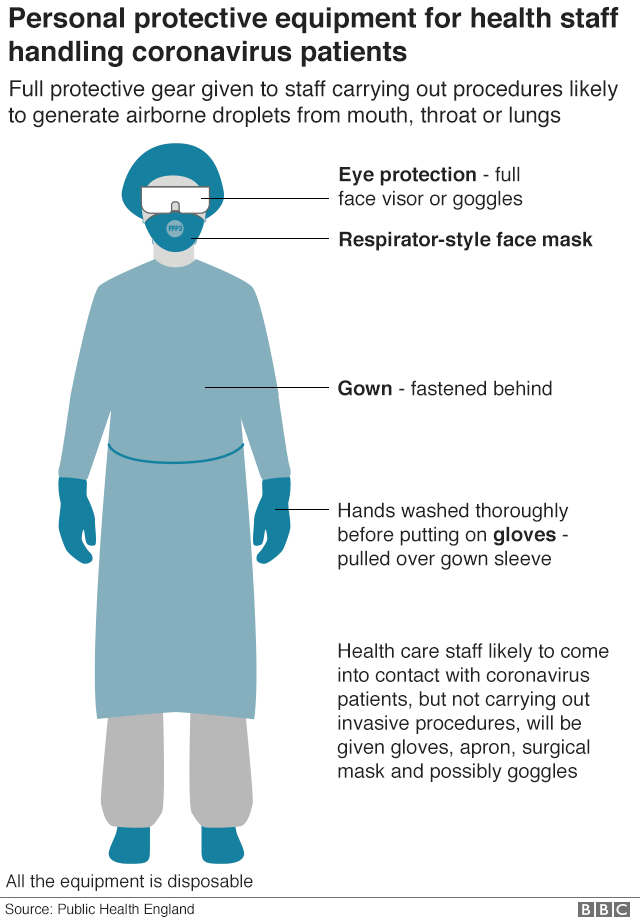
![]()
The general public are not advised to wear gloves or any other protective gear.
To protect yourself from coronavirus, the NHS recommends regular and through hand washing, covering your nose and mouth with a tissue when you cough or sneeze, and not touching your face with unwashed hands.
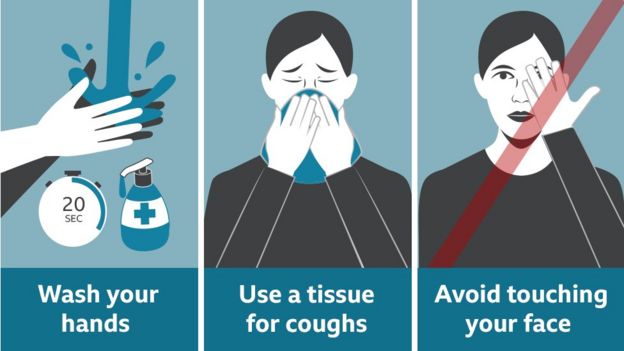
- Download the BBC News App for all the latest headlines.
